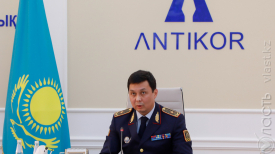- ВКонтакте
- РћРТвЂВВВВВВВВнокласснРСвЂВВВВВВВВРєРСвЂВВВВВВВВ
Since independence, Kazakhstan has actively pursued a “multi-vector” foreign policy, guided by the simple principle of being friends with everyone for the sake of attracting foreign investment. The publication of a registry of individuals and organizations that receive money from abroad, however, resembles measures taken in Russia, a country that has essentially left the international liberal system built by the West.
The list was published last week by the ministry of finance. In total, it includes 240 disparate legal entities and individuals - from journalists and local NGOs to small entrepreneurs and large foreign businesses.
There seems to be no guiding principle for being included in the list, which creates room for arbitrariness. Experts said the registry could have been created to amplify political risks for journalists, NGOs, and international organizations.
Back in 2018, the government mandated NGOs to report in detail on money and property received from abroad. And after Qandy Qantar (Kazakh for “Bloody January”), the attack on them only intensified. In January 2022, President Kassym-Jomart Tokayev directly stated that mass protests and violence had been incited by “the so-called free media and foreign figures.”
Tokayev’s actions seem to echo the decisions Russia’s Vladimir Putin made in response to the mass protests on Bolotnaya Square in 2011-2012. In the aftermath, Russian activists, NGOs, and media were put under pressure with the law “on foreign agents”, which made it possible to limit or stop their activities.
This law represents a crossroads in the history of contemporary Russia. After that, the country embarked on a path of war and internal repression of civil society and the media, which contributed to its isolation.
Russia had already outlined its opposition to the West in 2007, when Putin gave his landmark “Munich speech”, only to later invade Georgia. Kazakhstan, on its part, has never openly opposed the West.
Every presidential address and state program stress how Kazakhstan is eager to attract foreign investment. The government emphatically claimed to have attracted more than $400 billion from abroad in the past three decades. Kazakhstan’s image of a successful country is rooted in this principle.
Kazakhstan's aspirations turned into a farce, however, with the emergence of this registry. Social media commentators say that by including the international consulting company PWC or the law firm Baker & McKenzie the government is trying to distract from its attack on press freedom and human rights defenders. But the irony is that the government constantly cooperates with these large international companies on various investment projects.
Also, why is the government of Kazakhstan, which receives foreign assistance from other countries and international financial institutions, not included in the so-called list of “foreign agents”? The same goes for national companies like Kazmunaigas and Kazatomprom. After all, each of them has received foreign payments for the export of the country’s raw materials.
The government does not seem ready to provide answers to these questions. Instead, it probably plans to gradually create a repressive framework for eliminating the undesirables, following the example of Russia.
Поддержите журналистику, которой доверяют.








